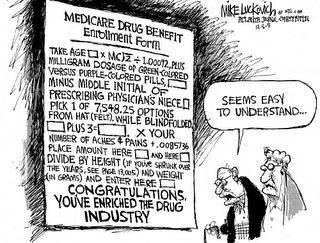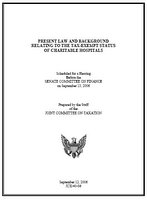 From the excellent Health Lawyers Weekly (AHLA member benefit), here's the table of contents from the September 22 issue:
From the excellent Health Lawyers Weekly (AHLA member benefit), here's the table of contents from the September 22 issue:Top Stories
- Phased-In Pay-For-Performance Program Would Encourage Healthcare Quality Improvement, IOM Finds: The Department of Health and Human Services (DHHS) should phase in a pay-for-performance system in order to promote improvements in the quality of healthcare, the Institute of Medicine (IOM) said in a report released September 21.For an initial period of three to five years, Congress should reduce base Medicare payments across the board and use the money to fund rewards for strong performance, the report said. Full Story
- OIG Approves Charitable Organization's Practice Of Providing Financial Assistance To Needy Medicare Patients For Treatment Of Certain Diseases:
In an advisory opinion posted September 21, the Department of Health and Human Services Office of Inspector General approved a nonprofit, tax-exempt, charitable organization's practice of providing certain therapy management services and financial assistance to financially needy Medicare beneficiaries undergoing treatment for certain diseases. Full StoryArticles & Analyses
- Grassley, The IRS Questionnaire, And Community Benefit: Are We Done Yet?, By Michael W. Peregrine, Robert C. Louthian, Elizabeth M. Mills McDermott Will & Emery LLP
- Caution Warranted For Employers As Supreme Court Adopts Broad Retaliation Test, By John P. Ryan and Kevin J. Gfell, Hall, Render, Killian, Heath & Lyman, P.C.
Current Topics
- Antitrust
1. FTC Says Non-Profit Institution Act Applies To Health System's Drug Purchase And Distribution Program
2. Seventh Circuit Rejects Anesthesiologist's Antitrust Challenge To Exclusive Contract Between Hospitals And Anesthesiology Group Practice- Arbitration/Mediation
Florida Appeals Court Compels Arbitration Under Nursing Home Admissions Agreement Even Though Portions Of Agreement Are Unconscionable- Employment and Labor
1. Fifth Circuit Rejects Hostile Work Environment Claim Against Nursing Home
2. U.S. Court In California Finds Physician's History Of Alcohol Dependency Does Not Constitute "Disability" Under ADA- Food and Drug Law
1. Legislation To Improve Research On Drug Safety Introduced In Senate
2. Study Finds Brand Name Prescription Drug Prices Continue To Rise, Manufacturers Group Disputes Findings
3. Grassley Presses FDA's Acting Commission To Improve Drug Safety Oversight
4. Generic Drugs Can Save Healthcare System Big Money, Senate Committee Told- Fraud and Abuse
1. Update
2. U.S. Court In Arkansas Dismisses Qui Tam Lawsuit Against Hospital And Oncologist At Affiliated Radiation Therapy Facility
3. U.S. Court In Tennessee Declines To Dismiss Qui Tam Lawsuit Against Manufacturer Of Implant Medical Devices- Health Information Technology
1. Provider Groups Tell Grassley, Baucus HIT Bill Poses No Antitrust Risk
2. Study Shows Physicians Slow To Adopt Email As Means Of Communicating With Patients- Health Policy
Commonwealth Fund Presents Results Of Its National Scorecard On U.S. Health System Performance- Insurance
U.S. Court In Louisiana Finds Excess Liability Insurance Policy Not Triggered When Settlement Does Not Exceed Primary Coverage- Medicaid
Federal Judge Dismisses Challenge To New Medicaid Citizenship Verification Requirement- Medical Malpractice
1. Texas Appeals Court Finds Patient's Claims Against Healthcare Facility Are Healthcare Liability Claims Under Relevant Statute
2. California Appeals Court Says Jury Should Decide Whether Physician Who Assisted In Chiropractic Procedure Owed Duty To Obtain Patient's Consent- Medicare
1. Medicare Providers Satisfied With Contractors, Survey Finds
2. Study Shows Medicare Cuts For Imaging Services Will Affect Patient Care, Group Says
3. OIG Report Finds Limiting Rental Payments For Home Oxygen Equipment Would Save Medicare $3.2 Billion Over Five Years
4. CMS Says LCD Clarifications Intended To Ensure Medicare Beneficiaries Have Access To Appropriate PMDs
5. CMS Proposes Limit On Recoupment Of Provider And Supplier Overpayments Until Second-Level Appeal Complete- News in Brief
Wal-Mart Will Offer Nearly 300 Generic Drugs At $4- Physicians
U.S. Court In Texas Says Physician Must Accept Reduced Damages Or Face New Trial In Credentialing Case Against Hospital
(c) 2006 AHLA. Reprinted with permission.













